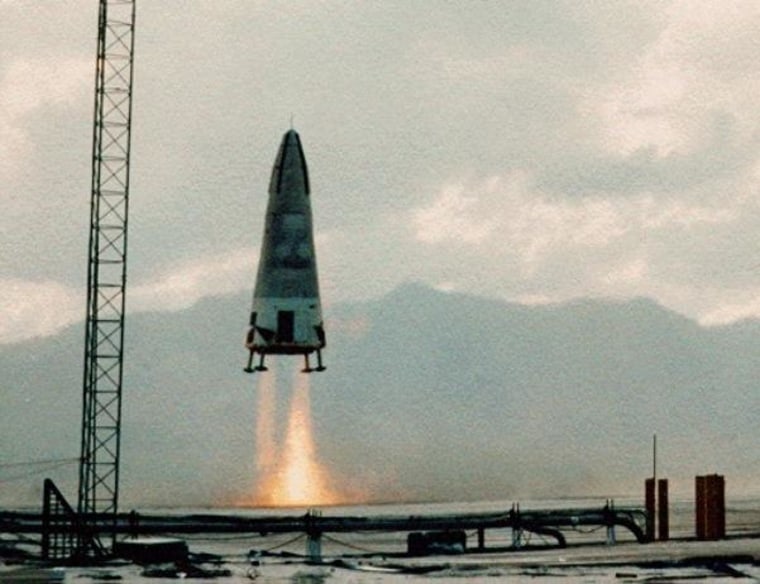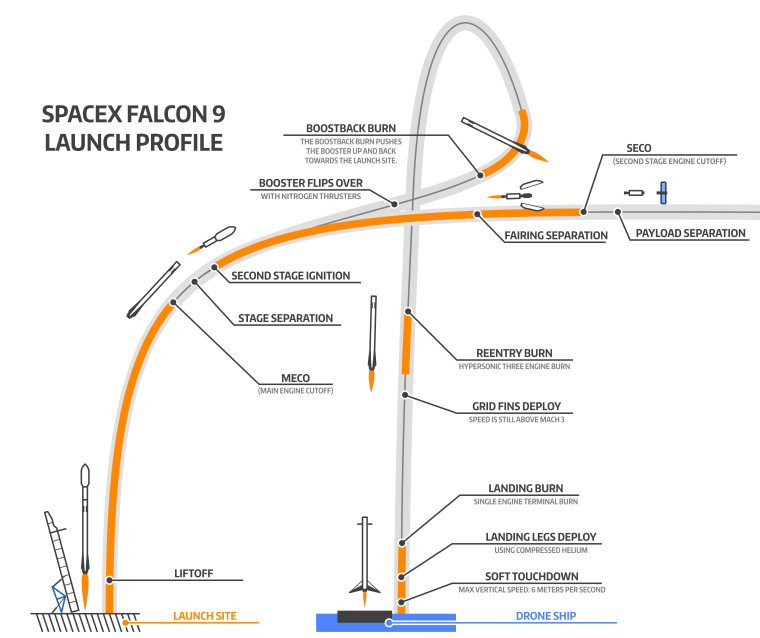CAPE CANAVERAL, Fla. — If SpaceX lands the first stage of its Falcon 9 rocket on an oceangoing drone ship after sending a Dragon cargo capsule to the International Space Station, the feat will mark one giant leap toward an era of rocket reusability in which space launches could be much more like airplane take-offs.
However, the leap builds upon many small steps — and missteps — that have been taken over the course of decades. And it'll take many more giant leaps to get to a true rocket revolution.
Rocketeers have tried to build reusability into launch systems even before the Space Age started, said Aleta Jackson, a co-founder of California-based XCOR Aerospace who has worked on rocket projects going back to the Gemini program of the 1960s.
"Many of us who were interested in space development and usage from an early age ... thought that reusable was the way to go," she told NBC News in an email. "But with the launch of Sputnik, that reasoned, incremental approach was abandoned for the need to beat the Soviets at any cost."
After Apollo ended, the quest for reusability resumed with vehicles ranging from NASA's space shuttles to the DC-X rocket of the mid-1990s, plus the Roton rocket-helicopter hybrid and the proposed VentureStar space plane of the late '90s. All those spacecraft and concepts have fallen by the wayside. Now it's SpaceX's turn.
After a couple of postponements due to concerns about a thrust vector actuator, SpaceX's Falcon 9 launch is set for 4:47 a.m. ET Saturday from Cape Canaveral Air Force Station in Florida. As of Friday afternoon, forecasters put the chance of acceptable weather at 80 percent. The attempt to land the first stage would take place about 10 minutes after launch, after it separates from the second stage and the Dragon spacecraft.
An autonomous spaceport drone ship will be stationed about 200 miles (300 kilometers) off Florida's Atlantic coast, waiting for the Falcon first stage to fly back and try a robo-landing.
Long-term campaign
SpaceX's billionaire founder, Elon Musk, sees the flyback ability of the upgraded Falcon 9 as a key element of his long-term campaign to make spaceflight so affordable that tens of thousands of people could move to Mars and turn humanity into a multiplanet species.
"If one can figure out how to effectively reuse rockets just like airplanes, the cost of access to space will be reduced by as much as a factor of a hundred," Musk once said. "A fully reusable vehicle has never been done before. That really is the fundamental breakthrough needed to revolutionize access to space."
NASA's space shuttles were designed to be mostly reusable, but it turned out that so much refurbishment was needed, and so many support personnel were required, that the shuttle flights averaged out to more than a billion dollars each.
"The key is actually reusability that is easy, that does not involve taking the rocket apart," Hans Koenigsmann, SpaceX's vice president of mission assurance, told reporters at NASA's Kennedy Space Center this week.

Besides the shuttle, the best-known effort to make rockets reusable was arguably the DC-X, or Delta Clipper Experimental, which was initiated by McDonnell Douglas for the Strategic Defense Initiative Organization in the early 1990s and later taken under NASA'S wing. The DC-X was an uncrewed rocket ship that took off and landed vertically during a series of tests in New Mexico.
When NASA Administrator Charlie Bolden was asked this week about SpaceX's rocket landing plan, he immediately referred back to the Delta Clipper.
"Some of you may remember the DC-X, so this is not something that has not been done before," he told reporters at Kennedy Space Center. "To do it this way would have been absolutely incredible, and it will be [incredible] when it's done."
The DC-X project was scrapped in 1996 after a landing leg failed to deploy and the test vehicle fell over.
The quest continues
The downfall of the DC-X, and of other concepts that didn't get nearly as far, didn't discourage Musk. And he's not the only one who's on the reusability quest: Blue Origin, the company founded by Amazon.com billionaire Jeff Bezos, has tested a suborbital rocket ship that's reminiscent of the DC-X. (Blue Origin also is in the midst of a patent dispute with SpaceX over the technology for landing a rocket on a floating platform.)
Other companies on the quest for rocket reusability include Masten Space Systems, Virgin Galactic — and XCOR Aerospace, which was founded by Jackson and other engineers who played roles in the Roton rocket projects.
Financial calculations can be nearly as important as the rocket equation, said XCOR's CEO and chairman, Jeff Greason. In order for a reusable launch system to be affordable, you need long-lasting hardware, a small labor force and a rapid turnaround time, he told NBC News.
"It's clearly been shown that rocket reusability with a small team is possible — but that doesn't make it inevitable, because the other factor in this is the market," Greason said.

For a larger version of this graphic, check out 'The Future of Space Launch Is Near' by John Gardi and Jon Ross.
XCOR has been focusing on propulsion system development for the past decade and a half, and the company is just now closing in on construction of its Lynx suborbital space plane. But eventually, XCOR plans to leverage the Lynx into a fully reusable orbital launch system.
It turns out that Greason is chasing the same dream Musk is after, by different means. "I hope they're successful," Greason said. "That would be a wonderful thing. ... A rising tide lifts all boats."
Jackson said it will take more than a single success. "The lesson from other reusables is: Keep it small, watch your weight, keep it simple, keep testing, keep going," she said.
If SpaceX's Falcon 9 rocket successfully lands at sea, that won't be the end of the quest for rocket reusability. Greason said it will be only the very beginning.
"But that doesn't understate the importance of what they're doing," Greason said. "It is quite something to have begun."